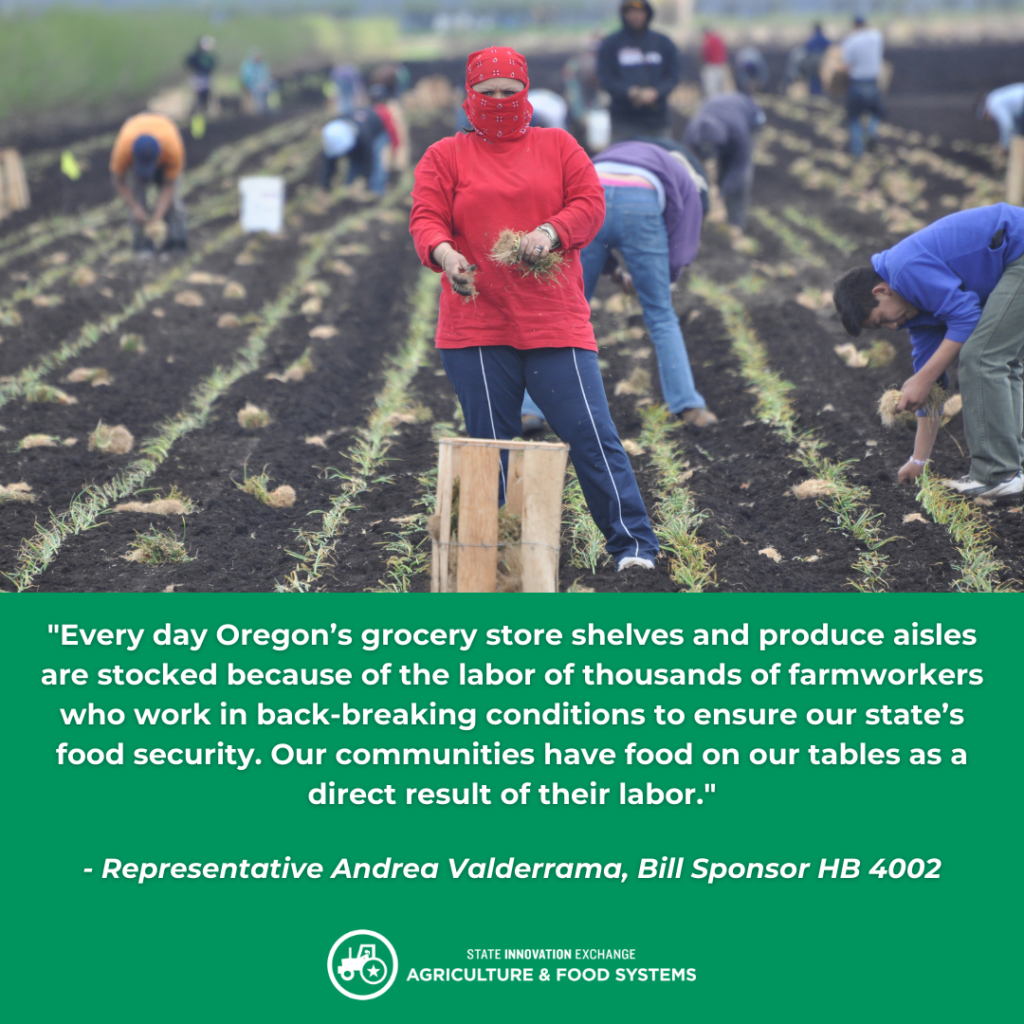In the final days of Oregon’s 2022 legislative session, legislators, advocates and farmworkers celebrated a historic win as Oregon joined seven other states including California, Washington and Colorado in mandating overtime pay for farmworkers.
Federal law exempts agricultural workers from basic workplace protections such as overtime pay, the right to unionize, minimum wage, mandatory breaks, and protection against retaliatory action, and most states follow that precedent. According to the Department of Labor’s most recent National Agricultural Workers Survey from 2018, approximately 83% of all agricultural workers in the U.S. were Latino and as many as 69% of agricultural workers were born in Mexico. Given that a significant portion of food and agriculture workers are people of color and immigrants, this exemption disproportionately harms Black and brown people.
A growing number of state legislators are looking to change this exclusion, working closely with advocates and farmers to bring food and farmworker protections equal to other industries’ labor standards and protections.
In Oregon, the farmworker overtime bill started when members from the largest Latino union in the state, Pineros y Campesinos Unidos del Noroeste (PCUN) voted to make farmworker overtime a priority for their political agenda in 2019. Over the course of several years, PCUN and other advocates worked with state legislators to address this issue ultimately culminating in House Bill 4002 which would phase in overtime pay for farmworkers over five years and included tax credits for small and medium sized farms.
Representative Andrea Valderrama, one of the bill’s sponsors says she was proud to sign-on as lead sponsor for HB 4003,
“Every day Oregon’s grocery store shelves and produce aisles are stocked because of the labor of thousands of farmworkers who work in back-breaking conditions to ensure our state’s food security. Our communities have food on our tables as a direct result of their labor. farmworkers often work long hours without rest, particularly during peak harvest times, and many still struggle to afford basic necessities. In the last two years, Oregon farmworkers have continued their labor through a pandemic, wildfire seasons marked by hazardous air quality levels, record high heat waves, and a historic ice storm.” she says.

Given what Oregon farmworkers have faced in the last few years, PCUN’s Policy Manager, Ira Cuello-Martinez says it was key to center farmworker’s voices in the policymaking process. “We focused on community organizing, building a diverse statewide coalition, and education. Organizers were reaching out to farmworkers two or three times a week,” he explained. “We held weekly coalition meetings to update partners on the policy, politics, and support needed for the campaign. We also had to do a lot of education with regard to the historical exclusion of farmworkers from overtime pay, the origins of overtime laws, and the farmworker landscape in our state.”
For Representative Valderrama, hearing from the farmworkers themselves was particularly moving. “As a member of [the Joint Committee on Farmworker Overtime], I heard concerns from farmers about the cost of paying overtime with seasonal work. I also heard directly from farmworkers who were pregnant and families working overtime because there simply wasn’t another option. These stories reminded me of my own family – overworked and overtired – for the simple hope of a more equitable future.”
These stories also motivated Valderrama to do intensive bi-partisan work with her colleagues to pass this bill which was facing fierce opposition from the Farm Bureau and corporate agribusiness lobby. For Representative Valderrama, fighting for this bill was critical because “Oregon’s hardworking farmworkers fundamentally deserve fair and equal workplace protections under the law.”
When asked if she has any advice for legislators in other states who want to increase protections for farmworkers Valderrama said “Passing farmworker overtime laws may not be easy and will likely face an incredible amount of opposition. It’s important for legislators to engage their colleagues across the aisle in a good faith effort, but never back down from fighting for farmworkers to have the same workplace protections as everyone else.”
Cuello-Martinez and Valderrama agree—simply passing overtime pay for farmworkers is just the beginning of the protections needed. Farmworkers across Oregon and the country continue to face discrimination. They are on the front lines of climate disasters and exposure to pesticides and smoke and they often lack safe and sanitary affordable housing.
“Farm work is one of the most hazardous occupations in the country, with constant exposure to dangerous pesticides, extreme heat, and wildfire smoke,” says Valderrama. “With a rapidly changing climate, we must continue advocating for safe working conditions for farmworkers, including heat and smoke-related protections, and ensuring that they receive living wages with access to safe, sanitary, and affordable housing,” She continues.
One of the ways Valderrama plans to protect farmworkers going forward is by centering family-friendly protections, “As a mom, I was particularly moved by some of the testimony from pregnant women or parents who were forced to bring their children to the fields when schools closed during the pandemic. Centering mothers and children in additional policy solutions is essential.”
———
If you are a state legislator interested in working on farmworker protection policy in your state—reach out to us at [email protected]

